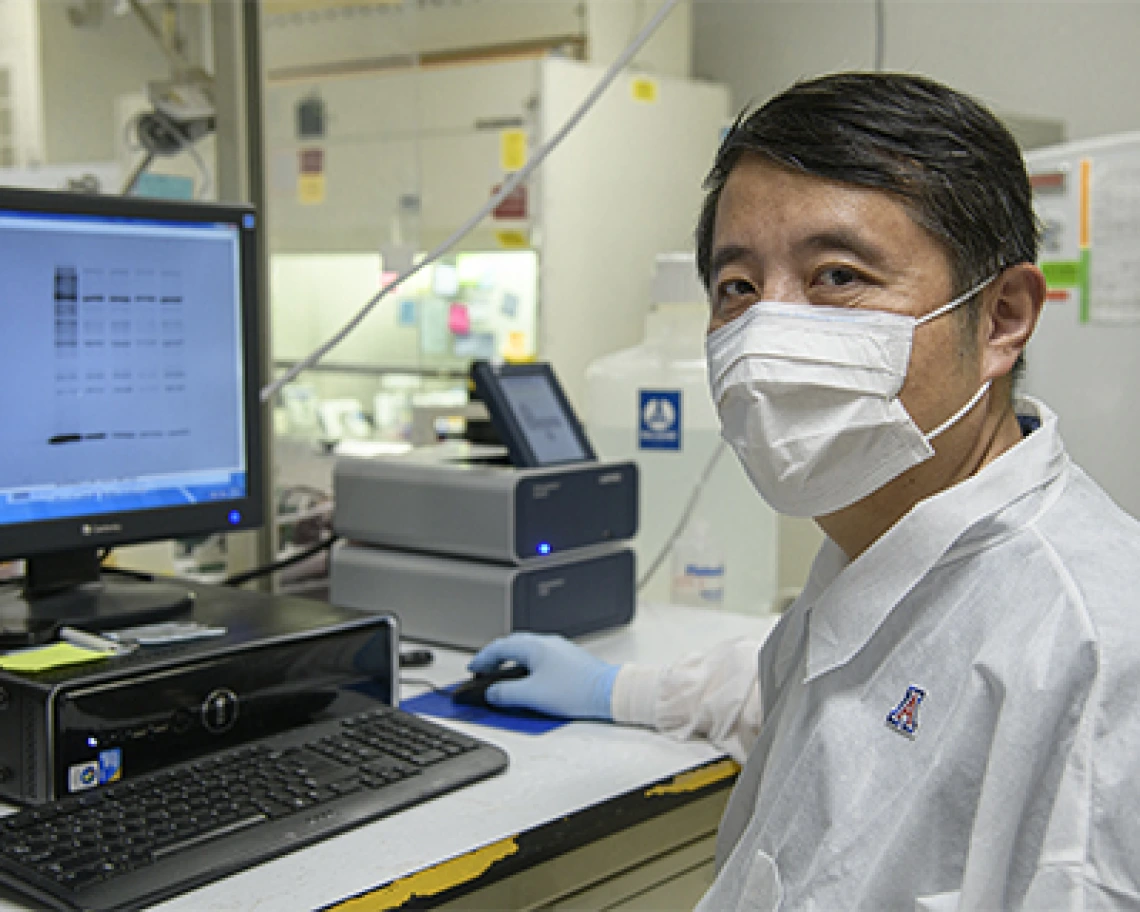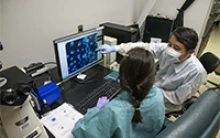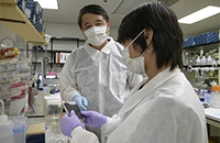$2.58M in Federal Funds Allow UArizona Health Sciences to Study Poorly Understood Fungal Asthma
Dr. Yin Chen and a University of Arizona Health Sciences research team hope to alleviate unmet medical need for this form of asthma that affects nearly a third of all asthma patients worldwide.

TUCSON, Ariz. – Thanks to new federal funding, a University of Arizona Health Sciences research team will seek to develop new, effective therapies to treat fungal asthma, a poorly understood form of the disease.

Yin Chen, PhD, associate professor at the UArizona College of Pharmacy, analyzes a gel image of interferon responsive proteins. (Photo: Kris Hanning/University of Arizona Health Sciences)
Affecting more than 25 million Americans, asthma is a condition in which the bronchial tubes become inflamed when triggered by an outside factor, whether that involves irritants in the environment, allergies, exercise, stress or even certain weather conditions. Fungal allergy drives asthma severity in large numbers, accounting for about 30% of asthma patients worldwide. Clinical data on fungal asthma, and its associated complications, however, is limited and current treatment is lacking, so Dr. Chen hopes this study will help fill those knowledge gaps.
“Asthma affects thousands of Arizonans each year, and this chronic disease can be fatal,” said University of Arizona President Robert C. Robbins, MD. “The research conducted by Dr. Chen through this significant grant will shed light on – and potentially help develop treatments for – a relatively unknown asthmatic trigger, which could make a huge difference in the lives of asthma patients impacted by this disease throughout the world.”

Yin Chen, PhD, points to an image of magnified virus-infected cells in his lab. (Photo: Kris Hanning/University of Arizona Health Sciences)
“This grant’s success will advance our knowledge about the development of fungal asthma in the short term,” Dr. Chen said. “In the long term, we will seek to develop an interferon-based therapy for the treatment of this disease.”
Interferon-based therapies have been used to treat viral infections such as hepatitis C. Named for their ability to interfere with viral replication, interferons are one of the body’s most rapidly produced and important defenses against viruses, but they also have been known to repress allergic responses in the body. In a recent study expected to be published later this year, Dr. Chen’s team made a surprising discovery that interferons also play a critical role in lung immunity against fungal infections.

Yin Chen, PhD, teaches a research scientist to analyze cellular proteins from samples. (Photo: Kris Hanning/University of Arizona Health Sciences)
As part of the grant-funded effort, Dr. Chen will test whether interferons can be used to treat fungal asthma by directly inhibiting fungal growth and repressing fungal allergy.
“Because interferon alpha and beta are approved drugs for other diseases, the success of our study will lay a foundation to repurpose them for fungal-asthma treatment, which has no effective therapy,” Dr. Chen said.
Among UArizona colleagues, Dr. Chen will collaborate with: Michael Daines, MD; Eugene Bleecker, MD; Deborah Meyers, PhD; Xingnan Li, PhD; Donata Vercelli, MD, and Fernando Martinez, MD, from the Asthma and Airway Disease Research Center; and College of Medicine – Tucson colleagues, Dominik Schenten, PhD, and Deepta Bhattacharya, PhD, with the Department of Immunobiology.
This research is supported by an NIAID/NIH grant under Award No. R01AI149754.
For more details on Dr. Chen’s work, see this UArizona Health Sciences Connect article.
# # #
NOTE: Photos available at this link – https://arizona.box.com/s/rhwyvn9yfdcupazc57imng32iv67wd8r.
About the University of Arizona College of Pharmacy
The University of Arizona College of Pharmacy is the premier pharmacy college in the Southwest, and one of the top in the nation, focused on drug discovery, toxicology, pharmaceutics, health outcomes and sciences, pharmaceutical education and research through interprofessional training and collaborative public/private partnerships. Preparing pharmacists and pharmaceutical scientists in undergraduate, professional, graduate and post-doctoral programs, the college embraces an entrepreneurial spirit, providing tailored educational opportunities to broaden students' experiences. Established 72 years ago as the first health sciences college at UArizona, the college has a long history of improving science and health, both in Arizona and around the world. It is currently ranked No. 8 among the nation’s 143 colleges of pharmacy by the American Association of Colleges of Pharmacy. For more information: pharmacy.arizona.edu (Follow us: Facebook | Twitter | Instagram | YouTube).
About the University of Arizona Health Sciences
The University of Arizona Health Sciences is the statewide leader in biomedical research and health professions training. UArizona Health Sciences includes the Colleges of Medicine (Tucson and Phoenix), Nursing, Pharmacy, and the Mel and Enid Zuckerman College of Public Health, with main campus locations in Tucson and the Phoenix Biomedical Campus in downtown Phoenix. From these vantage points, Health Sciences reaches across the state of Arizona, the greater Southwest and around the world to provide next-generation education, research and outreach. A major economic engine, Health Sciences employs nearly 5,000 people, has approximately 4,000 students and 900 faculty members, and garners $200 million in research grants and contracts annually. For more information: uahs.arizona.edu (Follow us: Facebook | Twitter | YouTube | LinkedIn | Instagram).

